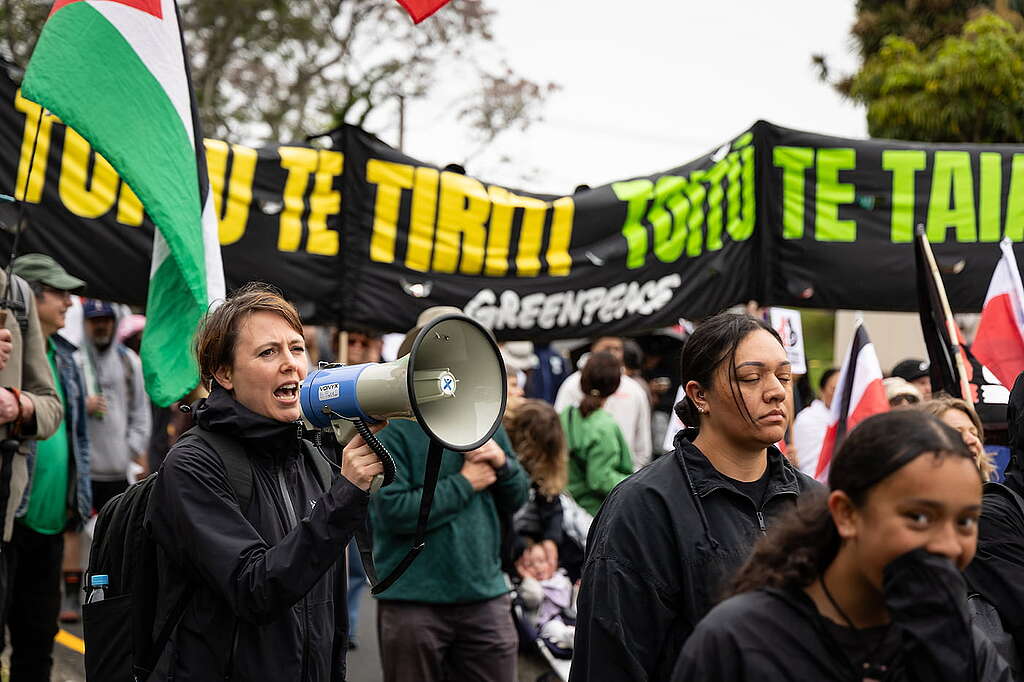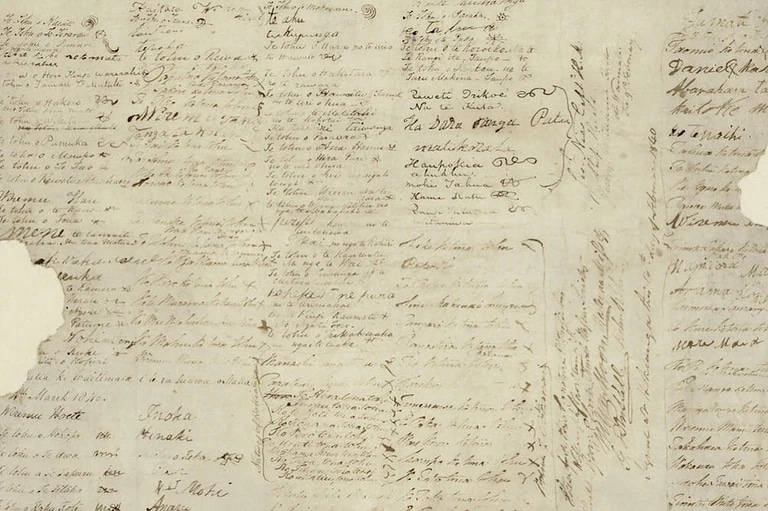UPDATE: Submissions for the Treaty Principles Bill have now closed. The Bill received an unprecedented response of more than 300,000 submissions, half of which came through on a single day.
Christopher Luxon’s Government is waging a war on nature by fast-tracking destructive projects like seabed mining and the long-dead Ruataniwha Dam.
At the same time, they’re launching a blatant attack on indigenous rights with the ‘Treaty Principles Bill’. This Bill is an attack on Te Tiriti o Waitangi and Māori right to self-determination. The Māori Law Society is calling it ‘An act of bad faith and deep dishonour’ and in a letter, called on the Prime Minister to kill the Treaty Principles bill before it reaches parliament and not wait for a first reading.

But this controversial and damaging bill has now passed its first reading in Parliament. And it’s since made global headlines for the controversy it’s caused. The giant Hīkoi mō Te Tiriti showed how strong and widespread the resistance is from both Māori and non-Māori – Tangata Whenua and Tangata te Tiriti.
But what is the Treaty Principles Bill? And why is it so widely opposed?
Table of contents
What’s wrong with the Treaty Principles Bill, and who opposes it?
There are a lot of things that are deeply problematic about the Act Party’s treaty Principles Bill. It was given life through the coalition agreement between Christoper Luxon’s National party and David Seymour’s Act Party. But it didn’t need to happen. Luxon could have ruled it out, as Russel Norman and Jane Kelsey explain here on Te Ao with Moana.
The Treaty Principles Bill is a blatant attack on indigenous rights. It would undermine Te Tiriti o Waitangi and remove its legal power as currently recognised.
The Bill knowingly misinterprets the articles of Te Tiriti o Waitangi. If it progresses, it will cause untold conflict and set back our journey of reconciliation as a nation by decades.
The Bill is based on bad faith and dishonest arguments. Even though Te Tiriti was an agreement between Māori and the Crown, Māori were not properly consulted.
The Waitangi Tribunal said in a 145-page report that if the bill were to be enacted, it would be the “worst, most comprehensive breach of the Treaty/te Tiriti in modern times”. It even said that the bill could mean the end of the Treaty itself if it was not repealed.
“Underlying the significant change across all statutory regimes that affect Māori, the Bill would end the Treaty/te Tiriti partnership and any formal relationship between the Crown and Māori.
“At present, the progressing of the Bill is having serious impacts on the relationship but the Bill if enacted would kill that relationship. This is deliberate.”
Te Tiriti is a taonga for this nation. It has provided a framework to make slow, difficult progress in addressing the painful truth of the history of colonisation and its present-day impacts.
Opposition to the bill has been widespread, from legal and political experts and organisations to faith-based organisations.
Why is Greenpeace opposing the Treaty Principles Bill?
As the Human Rights Commission said, Te Tiriti o Waitangi is the core agreement that affirms a place to belong and to stand for everyone who calls Aotearoa, New Zealand, home.
We believe that protecting Te Tiriti is a responsibility for all of us. We also believe that the forces pushing against Indigenous self-determination are the same forces that have no regard for the natural world that Greenpeace seeks to protect.
The Treaty Principles Bill seeks to undermine Māori rights as partners of Te Tiriti. Te Tiriti and the Tino Rangatiratanga that it guarantees means Māori making decisions for Māori, and that threatens the interests of greedy corporates who are seeking to gain unlimited access to exploit the people, forests, land and the oceans.
Like the Fast Track Bill, the Treaty Principles Bill clears the way for damaging corporate exploitation of the people, land and sea of Aotearoa. Destructive projects that previously could not have proceeded are now back on the table. These projects include seabed mining in the South Taranaki Bight, new coal mines on conservation land, industrial-scale waste incinerators and big new dairy dams.
Greenpeace joined the Hīkoi and made a submission opposing the Bill because it’s a grave injustice. Protecting Te Tiriti remains entwined with our mission to protect nature and peace.

Submissions on the Treaty Principles Bill
Unfortunately, submissions on the Treaty Principles Bill have now closed. But that doesn’t mean this is the end of opposition to the Bill.
Whilst the final number of submissions is not yet public, we know that the Committee received over 300,000 submissions. That’s more than triple the amount of submissions of any other bill to date – highlighting the Bill’s controversial nature.
On the last day of online submissions, the Government website even crashed as thousands flocked to make a submission. This resulted in an extension to the deadline.
What happens next?
The Justice Committee will spend February checking and reading the written submissions. The Committee also received over 16,000 requests for oral submissions. From this list, almost 500 people have been chosen to make a submission, totalling 80 hours of oral hearings. Oral submissions will include iwi, hapū, unions, organisations (including Greenpeace), and members of the public.
What even are the Treaty Principles?
Simply put, the Treaty Principles are a set of ideas intended to capture Te Tiriti’s broad sentiments, intentions and goals so that they can be incorporated into law and applied in practice.
The Treaty Principles are separate from the Treaty and have been created over many years by legal experts, the courts, constitutional experts and others. The Principles are necessary because there are two texts that are considered to be representative of the Treaty of Waitangi. These two documents have different meanings.

While Te Tiriti o Waitangi (the reo Māori version) upholds Māori sovereignty (tino rangatiratanga), the Treaty of Waitangi (the English version) says tāngata whenua forfeited it “absolutely and without reservation”. Both texts, however, affirm Māori rights and interests over taonga – both tangible ones like whenua and intangible ones like te reo Māori alike.
Importantly Te Tiriti o Waitangi, written in te reo Māori, was the version the majority of rangatira signed. It is also the variant recognised by international law as legitimate. There was also some rangatira who signed the English text, but it later transpired that they were read the Māori text, so for all intents and purposes, they actually endorsed that one and not the English one.
The Treaty Principles are not perfect. But they are the best thing we currently have for enacting Te Tiriti, which is our de facto constitution. New Zealand is one of only five countries without a proper written constitution, and that means Te Tiriti itself doesn’t explicitly feature in our law. This is where the Treaty Principles come from and why they’re so important. They are the Treaty’s representative within law and define the Treaty’s role today.
Further reading and Treaty Principles Bill submission guides
The principles of the Treaty of Waitangi, explained
Letter from Te Hunga Rōia Māori (the Māori law Society)
Human Rights Commission statement and submission
Tina Ngata on why the English text is not a valid treaty
Submission writing workshop by Koekoeā
Guide to making an oral submission
Hear from constitutional lawyer Moana Jackson about the Treaty of Waitangi.



